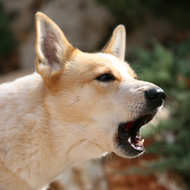Organised animal fighting on the increase

"People are deliberately breeding, training and fighting animals for the sole purpose of inflicting suffering."
Reports of organised animal fighting to the RSPCA have risen by a third in the past five years, despite dog and cockfighting being banned in the UK for 180 years.
The RSPCA say that in 2014 it received 594 calls to report incidents or information connected to organised animal fighting, compared to 449 it received in 2010 - an increase of almost 33 per cent.
The West Midlands emerged as the region with the most calls last year, followed by Greater London and Greater Manchester.
Chief inspector Ian Briggs, from the RSPCA's special operations unit which investigates organised animal crime, says that he is not surprised at the results.
“People look at me with amazement when I tell them about some of the things I’ve seen and heard of when it comes to dogfighting and cockfighting. Some people simply can’t believe it still happens, but it does and these new figures show that it is as much a problem now, if not more, than any other point in recent years.
“I’ve been investigating organised animal fighting for more than a decade and it still disgusts me, knowing that there are individuals who continue to take pleasure in watching animals brutally fight each other, often causing horrific and sometimes fatal injuries.
“RSPCA inspectors deal with countless instances of neglect caused by ignorance, but these cases are all about premeditated cruelty. People are deliberately breeding, training and fighting animals for the sole purpose of inflicting suffering.
“Hopefully one day organised animal fighting can truthfully be described as a thing of the past. Until then, we’ll keep investigating and try to bring about an end to such horrific levels of animal cruelty.”
Animal baiting and fighting was banned in England by the Cruelty to Animals Act in 1835. It is now covered by section eight of the Animal Welfare Act which makes it illegal to stage an animal fight, to take part in an animal fight, train animals for the purpose of fighting, to attend and/or publicise an animal fight, and to possess equipment designed to be used in connection with animal fighting.
Anybody with any information about animal fighting are urged to contact the RSPCA's 24 hour cruelty and advice line by calling 0300 1234 999.



 The RCVS has announced a new version of its 1CPD mobile app, with enhanced features for veterinary surgeons and veterinary nurses to record their continuing professional development.
The RCVS has announced a new version of its 1CPD mobile app, with enhanced features for veterinary surgeons and veterinary nurses to record their continuing professional development.